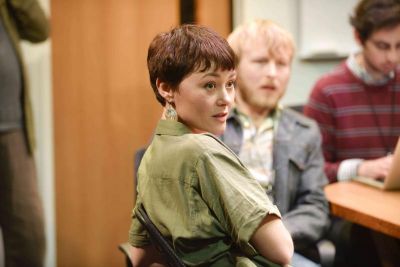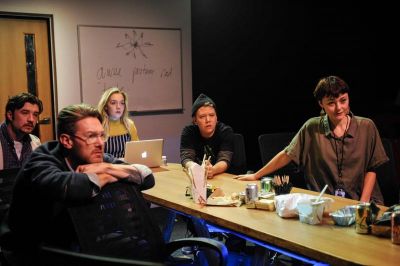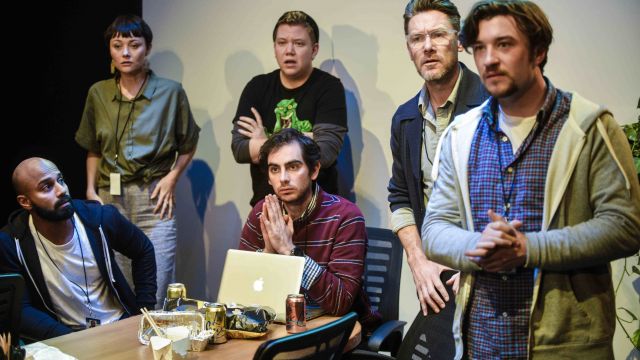The Antipodes
Annie Baker’s The Antipodes is set in a television ‘writers’ room’. Having spent a great deal of time in ‘writers’ rooms’ in my career, I wondered how Ms Baker would depict such a thing. It wasn’t going to be how, say, David Mamet would depict it. It turns out that her ‘writers’ room’ bears only tenuous resemblance to any real writers’ room in which I have worked – or indeed to any I’ve heard or read about.
Ms Baker’s intention would seem to be a metaphoric writers’ room in which six writers and a producer/showrunner struggle to find a story to tell: they spit ball, relate personal experiences, theorise and attempt to come up with a television show from scratch that is something ‘really special and original’. As there is no initial concept or premise on which to work – showrunner Sandy (Jim Daly) says the executives have given them carte blanche – there is no focus and it is hard to say if the assembled writers have any talent and therefore why they were hired. It is established, however, that Sandy has made successful shows in the past and is held in great respect by these writers.
But Sandy, as played by Mr Daly, is downbeat and provides no leadership or spark. I thought of the mercurial David Milch (NYPD Blue, Deadwood), of his ego-tripping and gnomic, pre-getting-down-to work waffle. The difference is that Milch’s writers’ rooms produced results – shows that got scripted and produced.

In this writers’ room, at Sandy’s request, the writers tell stories in response to that dated, intrusive gambit, ‘What was your first sexual experience?’ Or, ‘What is your greatest regret?’ This is supposed to open up the writers to themselves and each other which will in turn stimulate the work, supposedly the reason they are in the room.
But when one of the writers, Danny M2 (a sweet and touching performance from George Lingard) shyly tells his tiny, truthful, humiliating (and funny) ‘regret’ story, no one seems to get it – and he’s punished for it. Others speculate on the meaning of time and/or various philosophical/religious theories. Adam (Dushan Philips), the shy guy who’s scarcely spoken before, tells a rambling amalgam of creation myths. Even Sarah (a delightful Edwina Samuels), Sandy’s PA, gets to tell a story – urged on by the now desperate professionals – a story which begins with promising sincerity and spirals into mind-blowing but still sincere nonsense.
Director Ella Caldwell has found ways to move her cast around the single writers’ room table, relieving the feeling of stasis, and believably suggesting increasing exhaustion. The deliberately unreal proceedings are anchored to reality by various nicely observed writers’ room tropes. Sandy keeps taking presumably important phone calls and leaving the room looking troubled – but offering no explanation. Sarah appears – over and over – to take lunch orders – a clever way to indicate the passage of time. The writers around the table are all recognisable if underwritten types (whom this superb cast turn into characters). Josh (Harvey Zielinski) looks to be the youngest who, after months, still has no ID and hasn’t been paid. Dave (Darcy Kent) harps on how lucky they are to be there: he seems to be the most experienced ‘pro’ and his fierce loyalty to Sandy suggests he’s a reliable hack. Likewise, Danny M1 (Ben Prendergast), implying frequently that he’s on top of… well, whatever they’re trying to do. Ngaire Dawn Fair is Eleanor, the hippy-trippy one, who knits to maintain concentration (although on what?) and Brian (Casey Philips), one step above intern and there to take the notes, is twitchy, intense and the smartest guy in the room. As performed by this cast, I have encountered all these people in writers’ rooms. Ms Baker’s choice of characters is eerily accurate; are these people the personnel in all writers’ rooms?

What to make of this one hour and forty- minute play in which time passes but essentially nothing is achieved? Except perhaps to ask questions about stories and storytelling. Responses to past productions of this play appear to fall into two camps. On the one hand, it’s a profound examination of the central place and need to tell stories – to define who we are, why we’re here and where we’ve come from – and how we grope in the dark to do that. On the other hand, it’s something that is a bit tedious and pretentious that goes on far too long. Too clever by half? To those responses, I’d tentatively add that it is perhaps Ms Baker - Pulitzer Prize winner - sneering from a great height at those who make up the stories we see on television. It is all of these things – and why not? - and it is challenging in being a ‘play of ideas’ rather than a drama, realised by a director and a cast that could not be better.
Michael Brindley
Photographer: Jodie Hutchinson.
Subscribe to our E-Newsletter, buy our latest print edition or find a Performing Arts book at Book Nook.

